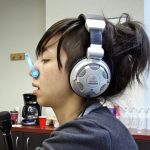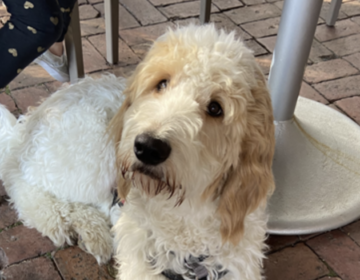Why heat is central to health in traditional Chinese medicine
Listen 5:53
Chinese herbalist and acupuncturist Cara Frank. (Liz Tung/WHYY)
For Chinese herbalist and acupuncturist Cara Frank, treating patients boils down to one thing: patterns.
“We have a saying in Chinese medicine and it’s really important,” she says. “One disease can have many causes, and one pattern can cause many diseases.”
Right now, the pattern she’s trying to unravel has to do with the tortured gut of a new patient – 32-year-old Sarah (not her real name), who, for the past few years, has been suffering from debilitating GI problems that include chronic nausea and diarrhea.
“My life has stopped,” Sarah says, fingering a string of wooden beads around her wrist. “I can’t go on vacation; I know every bathroom on the road. I’m going nuts.”
After several rounds of antibiotics, and visits to more than a dozen doctors, Sarah has landed at Frank’s Philadelphia office, seeking an alternative solution.
“I’ve gotten to a point where I’m really frustrated. It’s not normal to have 10, 12,15 bowel movements a day,” she says. “And the fact that every doctor is telling me, it’s just IBS, you have to deal with it, here’s another pill – I can’t do it anymore.”
Frank asks Sarah about her medical and personal history, probes her eating and sleeping habits, and asks about her symptoms. And then she zeroes in on more specific territory – does Sarah sweat at night? Is there mucus in her stool? Does she often feel hot or cold?
Frank, it turns out, has a culprit in mind – internal heat.
“There’s layered patterns in there,” Frank says afterwards, as she ticks off Sarah’s symptoms – anxiety, nausea, diarrhea, abdominal pain. “And there’s definitely one where there’s heat.”
Internal heat is a central concept in Traditional Chinese Medicine, or TCM, the millennia-old practice on which Frank’s work is based. While TCM is classified as alternative medicine in the West – where it’s become famous for treatments like acupuncture, cupping and herbal supplements – it occupies a prominent position in contemporary Chinese notions of wellness.
Many of those notions are grounded in a central idea of balance, or harmony, which can be maintained through diet, exercise and general self-care.
That balance can be thrown off, however, by what are known as the Six Excesses – cold, heat, dampness, dryness, summer heat and wind. Of those six, heat and cold are arguably the most important, as evidenced by their starring roles in that much-corrupted symbol of Chinese harmony: the yin-yang.
“To understand internal heat, you have to understand yin and yang,” Frank says. “Everybody knows what that symbol is. But very few people really have a deep understanding of what it represents.”
Cold, she says, is associated with yin, which translates to “shade,” and is represented by the black half of the circle. Heat, meanwhile, is associated with yang, which translates to “sunny.”
“Yang – the part of us that is warm and dynamic – comes in from the heavens and scoops down and creates this warmth in our body and the bottom,” she says. “This is like our furnace. Then yin from the earth – food – is transformed into energy. And that keeps us alive.”
According to TCM texts, both are necessary for health, but can become harmful in excess, leading to conditions ranging from the common cold to arthritis. It’s by tracing each patient’s unique constellation of symptoms that practitioners are able to make a diagnosis – or to put it in TCM terms, identify the pattern behind myriad ailments.
Sarah is a case in point. Her intake has revealed some serious issues. She had her gallbladder and appendix removed at 25, and was recently treated for a case of Clostridium difficile, better known as C. diff – a painful, potentially deadly bacterial infection that attacks the intestines.
Frank takes Sarah’s pulse, and examines her tongue, both common diagnostics in TCM. And then she confirms her suspicion.
“This tongue is a little too red, and it’s got a really thick coating, and it’s also very dry,” she says. “So that tongue reflects a lot of heat.”
Damp heat, to be precise. After completing her examination, Frank retreats to brainstorm Sarah’s treatment. She returns with a tailored mixture of herbs designed to clear heat, reduce inflammation, dry dampness and sooth both Sarah’s anxiety and her GI problems.
It’s a radically different approach from Western medicine, which Frank says is more focused on treating individual symptoms, rather than looking at the whole picture.
“I’m not against Western medicine in any way,” she says. “I just think that it hits a wall and it doesn’t have all the answers.”
In this case, she says, TCM may be able to help precisely because it’s addressing Sarah’s problems in the aggregate – as a unique pattern of symptoms that fit into the unique pattern of Sarah’s life.
“This is her experience of her life and it manifests in a particular way,” Frank says. “And so I’m treating the person in this way, and that that’s a very beautiful thing and it’s very human.”
WHYY is your source for fact-based, in-depth journalism and information. As a nonprofit organization, we rely on financial support from readers like you. Please give today.







